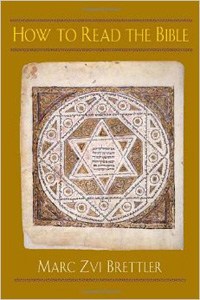Book Notes
 Marc Zvi Brettler, Peter Enns, and Daniel J. Harrington, The Bible and the Believer; How to Read the Bible Critically and Religiously (New York: Oxford, 2012), 210pp.
Marc Zvi Brettler, Peter Enns, and Daniel J. Harrington, The Bible and the Believer; How to Read the Bible Critically and Religiously (New York: Oxford, 2012), 210pp.
In 2 Timothy 3:16 we read that "all Scripture is inspired by God" — in the Greek, "God-breathed." It's a tantalizing text. What does it mean? The passage refers to what Christians call the Old Testament, but by extrapolation many believers also apply it to the New Testament. Believers affirm the Bible as the word of God, but it's also very much the word of man — about 40 men, to be exact, who wrote the mini-library of 66 books across more than a thousand years in cultural contexts that are now strange if not almost lost to us.
"The goal of this book is to show how Jews, Catholics, and Protestants can and do read the Hebrew Bible/Tanakh/Old Testament from a simultaneously critical and religious perspective." The focus is on the Old Testament, since that's the expertise of the three scholars and the shared Scripture of the three traditions. But the New Testament is implicated by default, since most believers affirm some version of Augustine's famous dictum that "the New Testament lies hidden in the Old, and the Old is made manifest in the New." In addition, the authors point out, "the New Testament authors quote the Old Testament well over three hundred times and allude to it over a thousand times."
The book has three essays, one each from the three traditions. Each essay is then followed by short responses from the other two authors. At the end of each chapter are suggestions for further reading. All three authors use the historical critical method to discern the meaning of the ancient text, although they acknowledge that some scholars (cf. Paul Ricoeur) consider this a fruitless effort to "unscramble the omelet." They also affirm the Bible's authority and contemporary significance.
Brettler explores how the Torah can be construed as both divine and Mosaic, a reliable source of revelation despite historical ambiguities. The Catholic teaching, says Harrington, is relatively straightforward thanks to the church's teaching magisterium. Enns admits that the Protestant position is problematic due to its wild diversity of opinions, the NT use of the OT, and because of the historical problems that beset the OT and which he thinks are "pervasive and beyond reasonable doubt."
In his commentary on the book of Acts (Brazos Press, 2005), the Yale historian Jaroslav Pelikan described "the predicament of the Christian historian" in affirming the Bible as both the word of God and the words of man. On the one hand, the historian must abide by the canons of the discipline. On the other hand, Pelikan said that he had no desire to suppress his own vibrant faith commitment. He compared the delicate task to a young doctor doing brain surgery on his mother. You want all the best science that's available, but you want it applied with tender, loving care.


